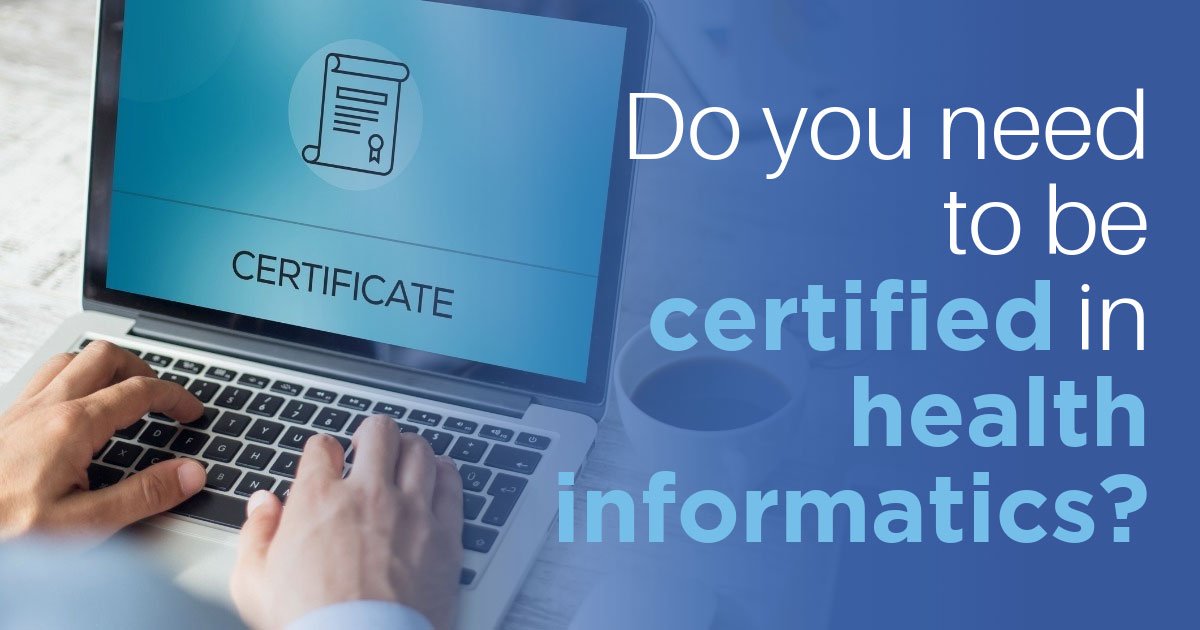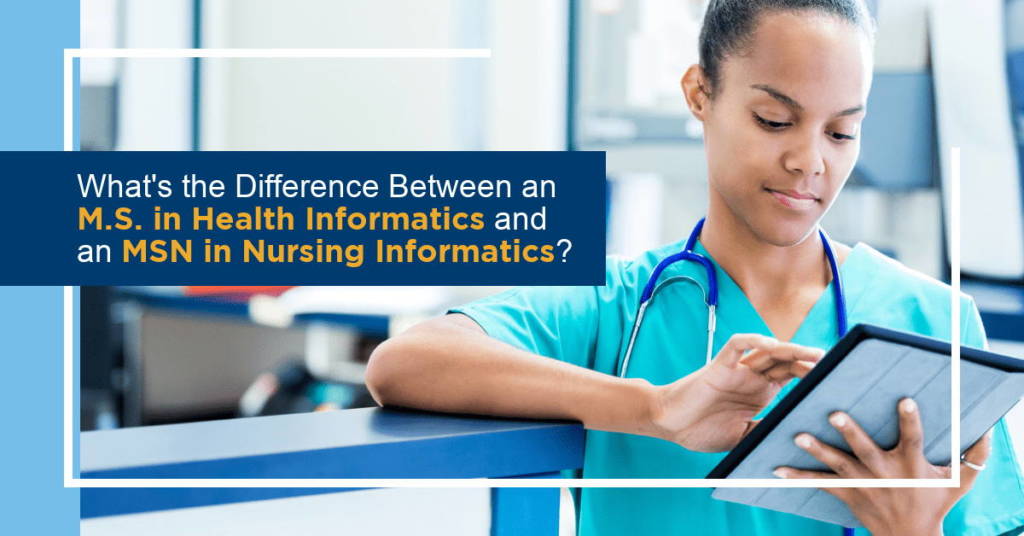One of the most common questions from those interested in the field of health informatics is, “Do I need a health informatics certification?” The answer varies depending on where you want to work and in what capacity. However, in general, because the field of health informatics is so new, many employers are still trying to determine what skill set to screen for and as a result, look for certifications as a third-party endorsement of a candidate’s knowledge and abilities. In addition to validating a candidate’s skills, a certification can help experienced informaticians stand out from the competition.
Yet, when it comes to earning a certification in health informatics there are a number of options to choose from.
Health Informatics Certificate vs. Health Informatics Certification
First, let’s quickly go over the difference between a certificate and certification.
The Institute for Credentialing Excellence, an organization focused on providing education, networking, and other resources related to credentialing, describes the distinction between these two terms as follows:
- A certification program is designed to test the knowledge, skills, and abilities required to perform a particular job, and, upon successfully passing a certification exam, to represent a declaration of a particular individual’s professional competence. In some professions, certification is a requirement for employment or practice.
- In contrast to certification and licensure, an assessment-based certificate program is an educational or training program that is used to teach learning objectives and assess whether those objectives were achieved by the student.
The Institute also provides a chart that offers a more detailed breakdown and a short video titled “Certificate vs. Certification: What’s the Difference?”
Health Informatics Certification Options
Healthcare Information and Management Systems Society (HIMSS)
HIMSS offers two certification paths. Their first certification, CAHIMS, is for those interested in entering the informatics field but lack experience and training.
Certified Associate in Healthcare Information and Management Systems (CAHIMS)
Designed for emerging professionals who may or may not have experience within the industry. CAHIMS is designed to be a pathway for careers in health IT.
 | Renewal: Must be renewed every 3 years |
 | Exam Format: 2-hour test with 115 multiple choice questions |
 | Eligibility: Must hold a high school diploma or its equivalent. |
Certified Professional in Healthcare Information and Management Systems (CPHIMS)
The second HIMSS certification, CPHIMS, is for experienced practitioners and is a professional certification program for experienced healthcare information and management systems professionals.
 | Renewal: Must be renewed every 3 years |
 | Exam Format: 2hour test with 115 multiple choice questions |
 | Eligibility: Must hold a bachelor’s degree from an accredited college or university and:
OR
|
American Nurses Credentialing Center (ANCC)
As the name implies, the ANCC certification is the perfect choice for current practicing nurses interested in the informatics field. As opposed to HIMMS certifications, ANCC tailors their program specifically for RNs.
Registered Nurse Board Certified (RN-BC)
 | Renewal: Must be renewed every 5 years |
 | Exam Format: Computer based test consists of 175 questions |
 | Eligibility: To be eligible for the ANCC informatics certification, you must hold a current active RN license; hold a bachelor’s or higher degree in nursing or a relevant field; have practiced the equivalent of 2 years full-time as a registered nurse; have completed 30 hours of continuing education in informatics nursing within the last 3 years and meet one of the following practice hour requirements:
|
American Health Information Management Association (AHIMA)
The AHIMA Registered Health Information Administrator (RHIA) certification was designed for those interested in managing patient health information, analyzing data and administering computer information systems. As AHIMA notes, RHIAs are “a critical link between care providers, payers, and patients.” They also offer an entry-level certification, RHIT, for those looking for a career as a health information technician. Professionals seeking these certifications are generally focused more on health information management (ensuring the quality of medical records, coding diagnoses and procedures in patient records for reimbursement, etc.). A CAHIIM-approved master’s degree in health information management is required to sit for the RHIA exam.
Registered Health Information Administrator (RHIA)
 | Renewal: Must be renewed every 2 years |
 | Exam Format: 4 hour, 180 multiple-choice questions |
 | Eligibility: Successfully complete the academic requirements, at the baccalaureate level, of an HIM program accredited by the Commission on Accreditation for Health Informatics and Information Management Education (CAHIIM).
Successfully complete the academic requirements, at the master’s level, of an HIM program accredited by CAHIIM and following a specific set of criteria.
OR
|
American Medical Informatics Association (AMIA)
The AMIA is also working towards the launch of a new certification intended for advanced informatics practitioners who have significant education and experience in the field. According to AMIA, this new certification dubbed the Advanced Health Informatics Certification (AHIC) will “join the Medical Subspecialty of Clinical Informatics as the standard-bearer for the highest and most rigorous level of evaluation for health informatics professionals.”
Advanced Health Informatics Certification (AHIC)
 | Renewal: TBD |
 | Exam Format: TBD |
 | Eligibility: Must actively practice health informatics with an operational focus on information and knowledge problems that directly impacts the practice of health care, public health, and personal health; and have earned:
OR
and have:
|
If you are interested in beginning or advancing a career in health informatics, earning your certification will help enhance your resume and demonstrate that you are qualified for a position with top employers in the field. HIMSS recommends getting certified to demonstrate that you meet a standard of professional body of knowledge, have reached a milestone in your professional development, distinguish yourself in an increasingly competitive marketplace, and expand your career opportunities.




